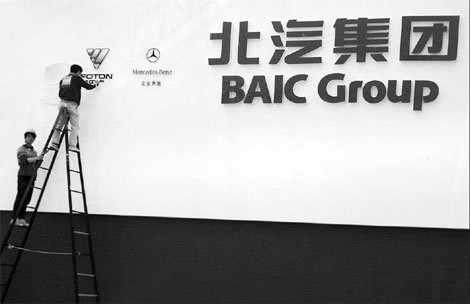|

Workers prepare a bulletin board of BAIC Group before the Beijing Auto Show in April. The Beijing-based carmaker has been consolidating its resources to strengthen its brand. Wu Changqing / For China Daily
|
Authorities move to boost sector with latest guidelines on M&A
BEIJING - Chinese authorities are pushing ahead with reforms for the country's automobile industry to leverage its increasingly important position in the global market.
In September, the State Council issued guidelines on promoting the merger and acquisitions (M&A) for six pillar industries. The automobile sector was ranked in the first position, followed by the steel, cement, machinery, electrolytic aluminum and rare earth sectors.
The Ministry of Industry and Information Technology is also mapping detailed guidelines for M&A in the automobile industry that are expected to come out by the end of this year, said Miao Wei, the vice-minister.
He said the guidelines will encourage and help forge mergers and cooperation between strong capable players, and across different regions, even in overseas markets. The restructuring is expected to make the industry leaner, stronger and tougher.
Last year, China overtook the United States to become the world's biggest automobile market through booming sales.
Currently, more than 130 big and small companies in 27 provinces dominate the segmental automobile sector in the nation. But there is fierce competition in the lower-end market, analysts said.
Chinese automakers should be strong enough as a national player, not a regional vehicle producer, before they ambitiously venture outside China, said Yin Jiaxu, board chairman of Chang'an Automotive (Group).
The latest guidelines will significantly clear away some existing policy obstructions in different regions for a truly national M&A environment, Miao said.
The State Council in March 2009 also said that China hopes to strengthen the auto industry by reducing the number of companies in the sector through mergers.
The government envisages reducing the number of major automakers, which are responsible for more than 90 percent of domestic production and sales, from 14 to 10 by the year 2011, with two or three firms having annual production capacities of 2 million units followed by four or five with output of 1 million units.
The new guidelines are expected to improve the requirements for the two or three industry leaders with capacities in excess of 3 million units annually, while the second rung of four or five automakers is expected to produce more than 1.5 million vehicles every year.
Analysts also said the guidelines, which encourage M&A among Chinese automakers without limitations in different regions and ownerships and which support the purchasing of assets or brands outside the country, will be a milestone in the Chinese automobile industry.
Guangzhou Auto is one of the first groups to expand nationally under the government plan. Last May, the company acquired a 29 percent stake in Shanghai-listed small SUV maker Hunan Changfeng Motor Co for nearly 1.2 billion yuan ($179.4 million), making it the largest shareholder.
It also signed a strategic cooperation agreement with Hangzhou-based minibus maker Gonow this April to restructure relevant assets of Gonow and build a 51-49 joint venture.
Zhang Fangyou, chairman of Guangzhou Auto, said the group hopes to expand its capacity and reinforce its research and development capability through M&A.
Access to manufacturing bases and markets in different regions through local players is easier and more reliable than direct investment in setting up factories, Zhang said.
China's privately owned enterprises have also started to focus on overseas markets and some of them are capable of going out of China, said Li Mingguang, an official with the Ministry of Commerce.
Last year, Warren Buffett-backed BYD Auto acquired the total stake in Hunan Midea Coach, an ailing bus maker in Changsha, for 60 million yuan.
This March, Zhejiang Geely Holding Group, China's No 10 automaker, also sealed a binding deal to buy waning Swedish luxury car brand Volvo from US giant Ford for $1.8 billion, completing China's biggest overseas auto purchase.
Geely's success in buying Volvo indicated that privately owned automakers will also be a strong power in overseas M&A, analysts said.
China Daily
(China Daily 11/02/2010 page14)
|


